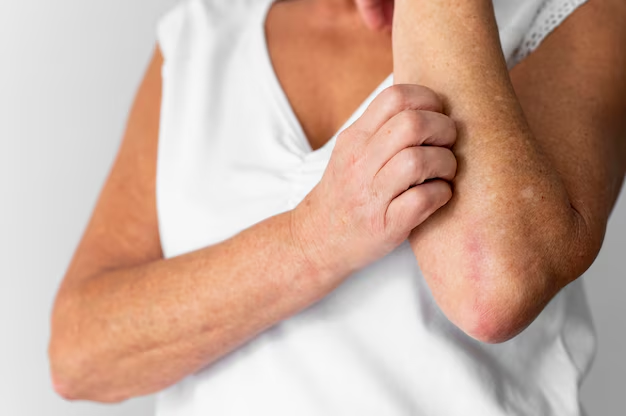Understanding Psoriasis: How It Starts and What You Need to Know
Psoriasis is often mentioned in conversations about skin conditions, but few understand how it really begins. For many, it starts as a series of perplexing symptoms that gradually escalate, leaving individuals searching for answers. This article delves into the beginnings of psoriasis, examines its triggers, and explores related aspects of this often misunderstood condition.
What is Psoriasis?
Psoriasis is a chronic autoimmune condition characterized by rapid skin cell proliferation, leading to scaling on the skin's surface. This accelerated cell turnover results in scales and red patches that can be itchy and, at times, painful. Understanding the nature of psoriasis is fundamental to grasping how it starts.
The Immune System's Role
Central to the development of psoriasis is the immune system's hyperactivity. In a normally functioning immune system, T cells (a type of white blood cell) act as warriors against harmful pathogens. However, in psoriasis, these T cells mistakenly attack healthy skin cells. This error causes an overproduction of skin cells and the associated symptoms.
The Onset of Psoriasis
The onset of psoriasis varies significantly among individuals. Factors such as genetic predisposition, environmental triggers, and immune system dysfunction play critical roles in its emergence. Let's examine these elements further.
Genetic Predisposition
Genetics is a key player in the development of psoriasis. If you have a family history of psoriasis, your likelihood of developing the condition increases. Recent studies have identified several genes linked to psoriasis, suggesting a hereditary component. However, having these genes does not guarantee you will develop psoriasis; it simply increases susceptibility.
Key Genetic Insights:
- PSORS1: The most common genetic location associated with psoriasis.
- Other genetic markers further complicate the picture, indicating that multiple genes can influence development.
Environmental Triggers
Environmental elements often act as catalysts for the onset of psoriasis in predisposed individuals. While triggers can vary from one person to another, some common influences are often observed.
Common Triggers Include:
- Stress: High levels of stress can initiate or exacerbate psoriasis flare-ups.
- Infections: In particular, streptococcal infections have been linked with guttate psoriasis.
- Weather: Cold weather can dry out the skin, potentially triggering symptoms.
- Injury: Known as the Koebner phenomenon, any skin injury like cuts or sunburns can trigger a psoriasis patch.
- Lifestyle Factors: Smoking and heavy alcohol consumption are known to trigger or worsen symptoms.
Types of Psoriasis and Their Onsets
Psoriasis is not a one-size-fits-all condition. Instead, it encompasses several different types, each with unique triggers and symptoms.
Plaque Psoriasis
The most common form, characterized by raised, red patches with a silvery white buildup of dead skin cells. These patches often appear on the elbows, knees, and scalp but can affect any area of the skin.
Guttate Psoriasis
Often beginning in childhood or young adulthood, guttate psoriasis is characterized by small, dot-like lesions. It can be triggered by a bacterial infection like strep throat.
Inverse Psoriasis
Appearing as bright red lesions, inverse psoriasis usually forms in body folds, such as under the breasts or in the groin area. It’s more common in overweight individuals and can be worsened by friction and sweating.
Pustular Psoriasis
This type manifests as white pustules surrounded by red skin. It's rare and can cover either small areas or large portions of the skin.
Erythrodermic Psoriasis
Erythrodermic psoriasis is a particularly severe and rare form, marked by widespread, fiery redness over large areas of the body. This form often requires immediate medical attention.
How Is Psoriasis Diagnosed?
Diagnosing psoriasis often begins with a physical examination. Dermatologists look for characteristic lesions on the skin. In some instances, a biopsy may be performed to rule out other skin conditions. Given its psychological and physical impact, early diagnosis can significantly improve quality of life.
Practical Tips for Managing Psoriasis
Understanding the onset and identifying triggers can be empowering for those affected. While treatment options should be discussed with healthcare professionals, here are some practical steps that can help in managing psoriasis.
Skincare Routine
Maintaining a moisturizing regimen is crucial. Frequent moisturization can help alleviate some symptoms by preventing dry skin and reducing itchiness. Look for fragrance-free, sensitive-skin formulas to avoid potential irritants.
Diet and Lifestyle
Some studies suggest dietary changes may benefit psoriasis patients. Although there's no one-size-fits-all psoriasis diet, those affected often explore options like:
- Omega-3 Fatty Acids: Found in fish, walnuts, and flaxseeds, which may reduce inflammation.
- Antioxidants: Berries, leafy greens, and nuts can support immune function.
- Vitamin D: Enhance your intake through sun exposure and foods like fortified cereals and fatty fish.
Stress Management
Given the link between stress and psoriasis flare-ups, incorporating stress-reducing activities can be advantageous. Techniques such as yoga, meditation, or mindfulness have been shown to decrease stress and consequently, reduce flare-up frequency.
When to Seek Professional Help
Recognition of symptoms is a vital step, but professional guidance is key for effective management. If you're experiencing severe symptoms, extensive body coverage, or if the condition significantly impacts your daily life, consult a dermatologist for an in-depth assessment.
Conclusion
Psoriasis often starts with a subtle change in the skin, but its effects can be profound and wide-reaching. By understanding its genetic and environmental influences, you better equip yourself to manage this chronic condition. Recognizing triggers, adopting suitable lifestyle changes, and seeking professional guidance are crucial steps in maintaining a better quality of life despite psoriasis.
**Quick Recap **
- 🔍 Understand Psoriasis: Learn about the autoimmune components of psoriasis and its various types.
- 🧬 Genetics & Environment: Both genes and environmental factors can trigger psoriasis onset.
- 💧 Skincare: Regularly moisturize to manage dryness and itching.
- 🍽️ Diet & Lifestyle: Incorporate anti-inflammatory foods and reduce stress.
- 🆘 Seek Help: Consult a dermatologist if symptoms are severe or life-impacting.
By keeping these factors in mind, you can navigate life with psoriasis knowledgeably and confidently.

